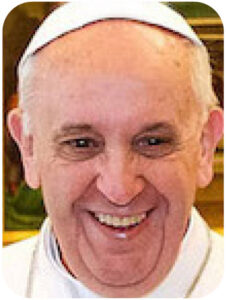ex libris — magisterial documents
Aperuit Illis (Instituting the Sunday of the Word of God) Pope Francis, 30 September 2019
Evangelii Guadium (Joy of the Gospel) Pope Francis, 24 November 2014
Lumen Fidei (Light of Faith) Pope Francis, 29 June 2013
Porta Fidei (Door of Faith) Pope Benedict XVI, 11 October 2011
This apostolic letter was written by Pope Benedict XVI to introduce the Year of Faith (October 11, 2012, to November 24, 2013), which commemorates the 50th anniversary of the Second Vatican Council and marks the 20th anniversary of the publication of the Catechism of the Catholic Church. Porta Fidei is founded on the premise that faith is a door that can usher men and women into life in communion with God.
“Caritas Christi urget nos: It is the love of Christ that fills our hearts and impels us to evangelize. Today as in the past, [Christ] sends us through the highways of the world to proclaim his Gospel to all the peoples of the earth. Through his love, Jesus Christ attracts to himself the people of every generation: In every age he convokes the Church, entrusting her with the proclamation of the Gospel by a mandate that is ever new. Today too, there is a need for stronger ecclesial commitment to new evangelization in order to rediscover the joy of believing and the enthusiasm for communicating the faith. In rediscovering his love day by day, the missionary commitment of believers attains force and vigor that can never fade away. Faith grows when it is lived as an experience of love received and when it is communicated as an experience of grace and joy. It makes us fruitful, because it expands our hearts in hope and enables us to bear life-giving witness: Indeed, it opens the hearts and minds of those who listen to respond to the Lord’s invitation to adhere to his word and become his disciples. Believers, so St. Augustine tells us, ‘strengthen themselves by believing.’ The saintly Bishop of Hippo had good reason to express himself in this way. As we know, his life was a continual search for the beauty of the faith until such time as his heart would find rest in God. His extensive writings, in which he explains the importance of believing and the truth of the faith, continue even now to form a heritage of incomparable riches, and they still help many people in search of God to find the right path towards the ‘door of faith.’”
Verbum Domini (Word of the Lord) Pope Benedict XVI, 30 September 2010
Sacramentum Caritatis (Sacrament of Love) Pope Benedict XVI, 22 February 2007
Ecclesia in Europa (The Church in Europe) Pope St. John Paul II, 28 June 2003
Rosarium Virginis Mariae (Rosary of the Virgin Mary)
Pope St. John Paul II, 16 October 2002
This apostolic letter of Pope St. John Paul II was written at the beginning of the 25th year of his pontificate to renew interest in the Rosary and to introduce the Year of the Rosary (October 2002 to October 2003). The first three lessons in Scripture and the Rosary: New Testament Mysteries, Old Testament Parallels focus on Rosarium Virginis Mariae. During his pontificate, Pope St. John Paul II published 1,600 messages and documents pertaining to the Blessed Virgin, more than three times as many as any other pope in history. In comparison, Pope Pius IX wrote five such messages or documents, Pope Leo XIII wrote 56, Pope Pius X wrote 37, Pope Benedict XV wrote 30, Pope Pius XI wrote 309, Pope Pius XII wrote 470, Pope John XXIII wrote 501, and Pope Paul VI wrote 315 Marian messages and documents. The following excerpt from Rosarium Virginis Mariae explains the reason behind Pope St. John Paul II’s dedication to promoting the Rosary among faithful Catholics.
“The most important reason for strongly encouraging the practice of the Rosary is that it represents a most effective means of fostering among the faithful that commitment to the contemplation of the Christian mystery which I have proposed in the Apostolic Letter Novo Millennio Ineunte as a genuine ‘training in holiness’: ‘What is needed is a Christian life distinguished above all in the art of prayer.’ Inasmuch as contemporary culture, even amid so many indications to the contrary, has witnessed the flowering of a new call for spirituality, due also to the influence of other religions, it is more urgent than ever that our Christian communities should become ‘genuine schools of prayer.'”
Novo Millennio Ineunte (Beginning of the New Millennium) Pope St. John Paul II, 6 January 2001
Fides et Ratio (Faith and Reason) Pope St. John Paul II, 14 September 1998
This encyclical was written to address contemporary philosophical concerns about religious faith and to show that not only are faith and reason compatible, both are essential to fulfill humanity’s basic need for spiritual truth.
“Recent times have seen the rise to prominence of various doctrines which tend to devalue even the truths which had been judged certain. A legitimate plurality of positions has yielded to an undifferentiated pluralism, based upon the assumption that all positions are equally valid, which is one of today’s most widespread symptoms of the lack of confidence in truth. Even certain conceptions of life coming from the East betray this lack of confidence, denying truth its exclusive character and assuming that truth reveals itself equally in different doctrines, even if they contradict one another. On this understanding, everything is reduced to opinion; and there is a sense of being adrift. While, on the one hand, philosophical thinking has succeeded in coming closer to the reality of human life and its forms of expression, it has also tended to pursue issues—existential, hermeneutical or linguistic—which ignore the radical question of the truth about personal existence, about being and about God. Hence we see among the men and women of our time, and not just in some philosophers, attitudes of widespread distrust of the human being’s great capacity for knowledge. With a false modesty, people rest content with partial and provisional truths, no longer seeking to ask radical questions about the meaning and ultimate foundation of human, personal and social existence. In short, the hope that philosophy might be able to provide definitive answers to these questions has dwindled. Sure of her competence as the bearer of the Revelation of Jesus Christ, the Church reaffirms the need to reflect upon truth. This is why I have decided to address you, my venerable Brother Bishops, with whom I share the mission of ‘proclaiming the truth openly,’ as also theologians and philosophers whose duty it is to explore the different aspects of truth, and all those who are searching; and I do so in order to offer some reflections on the path which leads to true wisdom, so that those who love truth may take the sure path leading to it and so find rest from their labors and joy for their spirit.”
Laetamur Magnopere (It Is a Cause for Great Joy) Pope St. John Paul II, 15 August 1997
Evangelium Vitae (Gospel of Life) Pope St. John Paul II, 25 March 1995
Veritatis Splendor (Splendor of Truth) Pope St. John Paul II, 6 August 1993
Fidei Depositum (Deposit of Faith) Pope St. John Paul II, 11 October 1992
Redemptoris Mater (Mother of the Redeemer) Pope St. John Paul II, 25 March 1987
Written by Pope St. John Paul II, this encyclical addresses the role of the Blessed Virgin Mary in the life of the Pilgrim Church.
“It is a fact that when ‘the fullness of time’ was definitively drawing near – the saving advent of Emmanuel – he who was from eternity destined to be his Mother already existed on earth. The fact that she ‘preceded’ the coming of Christ is reflected every year in the liturgy of Advent. Therefore, if to that ancient historical expectation of the Savior we compare these years which are bringing us closer to the end of the second Millennium after Christ and to the beginning of the third, it becomes fully comprehensible that in this present period we wish to turn in a special way to her, the one who in the ‘night’ of the Advent expectation began to shine like a true ‘Morning Star’ (Stella Matutina). For just as this star, together with the ‘dawn,’ precedes the rising of the sun, so Mary from the time of her Immaculate Conception preceded the coming of the Savior, the rising of the ‘Sun of Justice’ in the history of the human race.”
Familiaris Consortio (Role of the Christian Family in the Modern World) Pope St. John Paul II, 22 November 1981
Salvific Doloris (On the Christian Meaning of Redemptive Suffering) Pope St. John Paul II, 11 February 1984
Dives in Misericordia (Rich in Mercy) Pope St. John Paul II, 30 November 1980
Redemptor Hominus (Redeemer of Man) Pope St. John Paul II, 4 March 1979
Marialis Cultus (Devotion to Mary)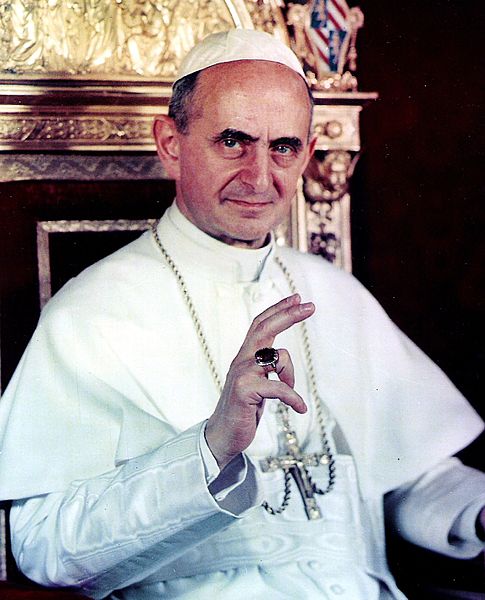 Pope Paul VI, 2 February 1974
Pope Paul VI, 2 February 1974
This apostolic exhortation by Pope Paul VI was written to enhance devotion to the Blessed Virgin Mary in connection with the liturgical reform promoted by the Second Vatican Council.
“Today it is recognized as a general need of Christian piety that every form of worship should have a biblical imprint. The progress made in biblical studies, the increasing dissemination of the Sacred Scriptures, and above all the example of Tradition and the interior action of the Holy Spirit are tending to cause the modern Christian to use the Bible ever increasingly as the basic prayerbook, and to draw from it genuine inspiration and unsurpassable examples. Devotion to the Blessed Virgin cannot be exempt from this general orientation of Christian piety, indeed it should draw inspiration in a special way from this orientation in order to gain new vigor and sure help. In its wonderful presentation of God’s plan for man’s salvation, the Bible is replete with the mystery of the Savior, and from Genesis to the book of Revelation, also contains clear references to her who was the Mother and associate of the Savior. We would not, however, wish this biblical imprint to be merely a diligent use of texts and symbols skillfully selected from the Sacred Scriptures. More than this is necessary. What is needed is that texts of prayers and chants should draw their inspiration and their wording from the Bible, and above all that devotion to the Virgin should be imbued with the great themes of the Christian message. This will ensure that, as they venerate the Seat of Wisdom, the faithful in their turn will be enlightened by the divine word and be inspired to live their lives in accordance with the precepts of Incarnate Wisdom.”
Christi Matri (Mother of Christ) Pope Paul VI, 15 September 1966
This encyclical was written by Pope Paul VI to encourage prayers for peace, especially in southeast Asia where the Vietnam War raged in Vietnam, Laos, and Cambodia from 1955 to 1975.
“Nothing seems more appropriate and valuable to us than to have the prayers of the whole Christian family rise to the Mother of God, who is invoked as the Queen of Peace, begging her to pour forth abundant gifts of her maternal goodness in midst of so many great trials and hardships. We want constant and devout prayers to be offered to her whom we declared Mother of the Church, its spiritual parent, during the celebration of the Second Vatican Council, thereby winning the applause of the Fathers and of the Catholic world, and confirming a point of traditional doctrine. For the Mother of the Savior is, as St. Augustine teaches, ‘surely the mother of His members,’ and St. Anselm, to mention only one other, agrees with him in these words: ‘What could ever be deemed more suitable than for you to be the mother of those whose father and brother Christ deigned to become?’ She was called ‘most truly the mother of the Church’ by our predecessor Leo XII. Hence we have good reason to place our trust in her in the midst of this terrible disorder.”
Gaudium et Spes (Pastoral Constitution on the Church in the Modern World) Pope Paul VI, 7 December 1965
Dei Verbum (Dogmatic Constitution on Divine Revelation) Pope Paul VI, 18 November 1965
Nostra Aetate (Relation of the Church with Non-Christian Religions) Pope Paul VI, 28 October 1965
Lumen Gentium (Dogmatic Constitution on the Church) Pope Paul VI, 21 November 1964
Grata Recordatio (With Joyful Recollection)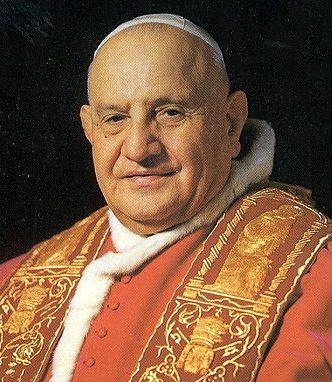 Pope John XXIII, 26 September 1959
Pope John XXIII, 26 September 1959
Pope John XXIII fondly remembers the encyclicals of Pope Leo XIII urging Catholics to pray the Rosary during the month of October. Grata Recordatio encourages prayers for Church missions and international and social problems facing the world at the time the encyclical was written.
“These pleasant memories of our younger days have not faded or vanished as the years of our life have passed. On the contrary, we want to declare in complete frankness and simplicity that the years have made Mary’s rosary all the dearer to us. We never fail to recite it each day in its entirety and we intend to recite it with particular devotion during the coming month. During our first year as pope—a year which is almost over—we have several times had occasion to urge the clergy and laity to public and private prayer. But today we make this same request with even greater emphasis and earnestness.”
Ingruentium Malorum (In the Face of Approaching Evils)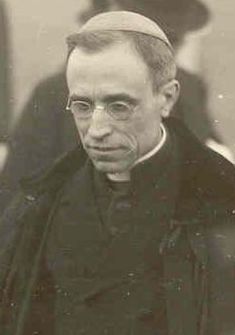 Pope Pius XII, 15 September 1951
Pope Pius XII, 15 September 1951
In this encyclical, Pope Pius XII urges the recitation of the Rosary as a weapon against “the calamitous conditions” plaguing the world during his reign as Vicar of Christ.
“However, consideration of a situation so pregnant with dangers must not depress your souls, Venerable Brethren. Instead, mindful of that Divine teaching: ‘Ask and it shall be given to you; seek and you shall find; knock, and it shall be opened to you’ (Luke 11:9), fly with greater confidence to the Mother of God. There, the Christian people have always sought chief refuge in the hour of danger, because ‘she has been constituted the cause of salvation for the whole human race’ (St. Irenaeus).”
Ingravescentibus Malis (Ever-Growing Evils)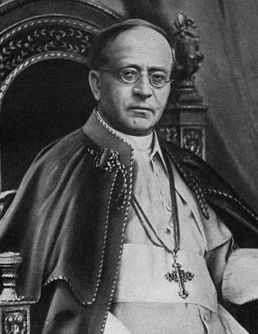 Pope Pius XI, 29 September 1937
Pope Pius XI, 29 September 1937
On the brink of World War II, Pope Pius XI seeks to bring about a return to Jesus Christ and the precepts of the through pious praying of the Rosary.
“And so much more must it be done since the enemies of the Divine Name – that is, those who have rebelled against and denied and scorned the Eternal God – spread snares for the Catholic Faith and the liberty due to the Church, and finally rebel with insane efforts against divine and human rights, to send mankind to ruin and perdition. Through efficacious recourse to the Virgin Mother of God, may they be finally bent and led to penance and return to the straight path, trusting to the care and protection of Mary.”
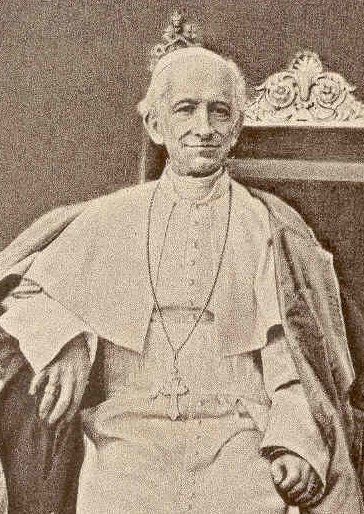 Diuturni Temporis (Through the Eternity of Time) Pope Leo XIII, 5 September 1898
Diuturni Temporis (Through the Eternity of Time) Pope Leo XIII, 5 September 1898
In the last encyclical he wrote about the Rosary. Pope Leo XIII presents a brief overview of the devotion of previous popes to the Blessed Virgin Mary and summarizes his own previous encyclicals.
“Looking back over the long space of time, which by God’s will we have passed in the Supreme Pontificate, we cannot but acknowledge that, in spite of our demerits, we have enjoyed the most singular protection of Divine Providence. This we believe must be attributed principally to the united, and therefore most efficacious, prayers, which, as of old for St. Peter, so now also for ourselves, as constantly being poured forth by the universal Church. Wherefore we first of all give profound thanks to God, the giver of all good things, and we shall continue as long as life lasts to cherish in mind and heart gratitude for each and every favor. And next, there comes to our mind the sweet remembrance of the motherly protection of the august Queen of Heaven; and this memory likewise we shall cherish and preserve inviolate, ever thanking her and proclaiming her benefits. From her, as from an abundant spring, are derived the streams of heavenly graces.”
Augustissimae Virginis Maria (The Most August Virgin Mary) Pope Leo XIII, 12 September 1897
In his desire to promote devotion to the Blessed Virgin Mary, Pope Leo XIII honors the Confraternity of the Holy Rosary and urges continued reliance on praying the Rosary as a weapon in the Church’s battle against evil in the world.
“From the fact that this warfare of prayer is ‘enrolled under the name of the Mother of God,’ fresh efficacy and fresh honor are thereby added to it. Hence the frequent repetition in the Rosary of the ‘Hail Mary’ after each ‘Our Father.’ So far from this derogating in any way from the honor due to God, as though it indicated that we placed greater confidence in Mary’s patronage than in God’s power, it is rather this which especially moves God, and wins his mercy for us.”
Fidentem Piumque Animum (On the Rosary) Pope Leo XIII, 20 September 1896
In this encyclical, Pope Leo XIII appeals to the minds and hearts of the faithful to bring about an increase of religion and to stimulate within Christians the hope of eternal reward.
“It is here the place to add a remark respecting the duties of those virtues which faith rightly postulates. Among them is the virtue of penance, and one part of this is abstinence, which for more reasons than one is necessary and salutary. It is true that the Church is growing more indulgent towards her children in this matter, but they must understand they are bound to take all care to make up for this maternal indulgence by other good works. We rejoice for this reason also to propose particularly the use of the Rosary, which is capable of producing worthy fruits of penance, especially by the remembrance of the sufferings of Christ and his Mother.”
Adiutricem (Mightiest Helper) Pope Leo XIII, 5 September 1895
Adiutricem lauds the Blessed Virgin Mary for the great assistance she is able to offer Christians and urges the faithful to call upon her with confidence.
“Since faith is the foundation, the source, of the gifts of God by which man is raised above the order of nature and is endowed with the dispositions requisite for life eternal, we are in justice bound to recognize the hidden influence of Mary in obtaining the gift of faith and its salutary cultivation of Mary who brought the ‘author of faith’ into this world and who, because of her own great faith, was called ‘blessed.'”
Iucunda Semper Expectatione (Always with Joyful Expectation) Pope Leo XIII, 8 September 1894
In this encyclical, Pope Leo XIII writes of the joy with which he awaits the month of October, since it is consecrated to the Blessed Virgin Mary and is a time of renewed emphasis on praying the Rosary.
“A soul that shall devoutly repeat these prayers, that shall ponder with faith these mysteries, will, without doubt, be filled with wonder at the divine purposes in this great Virgin and the work of the restoration of mankind. Doubtless, this soul, moved by the warmth of love for her and of confidence, will desire to take refuge upon her breast, as was the sweet feeling of St. Bernard: ‘Remember, O most pious Virgin Mary, that never was it heard that any who fled to thy protection, called up on they help, and sought thy intercession, was left forsaken.’ But the fruits of the Rosary appear likewise, and with equal greatness, in the turning with mercy of the heart of the Mother of God towards us.”
Laetitiae Sanctae (Of Holy Praise) Pope Leo XIII, 8 September 1893
Offering appreciation to the Blessed Virgin Mary for her intercession throughout his life, Pope Leo XIII encourages others to express their devotion to Mary through the prayers of the Rosary for the benefit of the world, especially in overcoming the three influences seen as negatively affecting society: 1) the distaste for a simple and laborious life, 2) repugnance to suffering of any kind, and 3) forgetfulness of the future life.
“For evils such as these let us seek a remedy in the Rosary, which consists in a fixed order of prayer combined with devout meditation on the life of Christ and his Blessed Mother. Here, if the joyful mysteries be but clearly brought home to the minds of the people, an object lesson of the chief virtues is placed before their eyes. Each one will thus be able to see for himself how easy, how abundant, how sweetly attractive are the lessons to be found therein for the leading of an honest life.”
Magnae Dei Matris (The Great Mother of God) Pope Leo XIII, 8 September 1892
In this encyclical, Pope Leo XIII describes his personal experience confiding in the Blessed Virgin Mary and seeking refuge with her from “many dreadful events of every kind,” and he urges others to turn to her in prayer.
“The Rosary offers an easy way to present the chief mysteries of the Christian religion and to impress them upon the mind; and this commendation is one of the most beautiful of all. For it is mainly by faith that a man sets out on the straight and sure path to God and learns to revere in mind and heart his supreme majesty, his sovereignty over the whole of Creation, his unbounded power, wisdom, and providence.”
Octobri Mense (The Month of October) Pope Leo XIII, 22 September 1891
The suffering of the Church is the theme of this encyclical, in which the faithful are urged the to pray the Rosary with renewed fervor and devotion.
“Now among the several rites and manners of paying honor to the Blessed Mary, some are to be preferred, inasmuch as we know them to be most powerful and most pleasing to our Mother; and for this reason we specially mention by name and recommend the Rosary. The common language has given the name of corona to this manner of prayer, which recalls to our minds the great mysteries of Jesus and Mary united in joys, sorrows, and triumphs. The contemplation of these august mysteries, contemplated in their order, affords to faithful souls a wonderful confirmation of faith, protection against the disease of error, and increase of the strength of the soul.”
Vi E Ben Noto (To You It Is Known) Pope Leo XIII, 20 September 1890
This very short encyclical primarily is addressed to the Church in Italy but opens by beseeching the entire Church to pray the Rosary.
“You know how we place amid present dangers our confidence in the glorious Virgin of the Holy Rosary, for the safety and prosperity of Christendom and the peace and tranquility of the Church. Mindful that in moments of great trial, pastors and people have ever had recourse with entire confidence to the august Mother of God, in whose hands are all graces, certain too, that devotion to Our Lady of the Rosary is most opportune for the needs of these times, we have desired to revive everywhere this devotion, and to spread it far and wide among the faithful of the world.”
Superiore Anno (Last Year) Pope Leo XIII, 30 August 1884
Writing to commemorate the one-year anniversary of honoring the Blessed Virgin Mary through increased devotion to the Rosary during the month of October, Pope Leo XIII decrees that the practice be repeated.
“Last year, as each of you is aware, we decreed by an encyclical letter that, to win the help of heaven for the Church in her trials, the great Mother of God should be honored by the means of the most holy Rosary during the whole of one month of October. In this we followed both our own impulse and the example of our predecessors, who in times of difficulty were wont to have recourse with increased fervor to the Blessed Virgin, and to seek her aid with special prayers. That wish of ours has been complied with, with such a willingness and unanimity that it is more than every apparent how real is the religion and how great is the fervor of the Christian peoples, and how great is the trust everywhere placed in the heavenly patronage of the Virgin Mary. For us, weighed down with the burden of such and so great trials and evils, we confess that the sight of such intensity of open piety and faith has been a great consolation, and even gives us new courage for the facing, if that be the wish of God, of still greater trials.”
Supremi Apostolatus Officio (The Supreme Apostolic Office) Pope Leo XIII, 1 September 1883
It was with this encyclical that Pope Leo XIII introduced the practice of praying the Rosary with increased fervor and devotion during the month of October.
“Not only do we earnestly exhort all Christians to give themselves to the recital of the pious devotion of the Rosary publicly, or privately in their own house and family, and that unceasingly, but we also desire that the whole of the month of October in this year should be consecrated to the Holy Queen of the Rosary. We decree and order that in the whole Catholic world, during this year, the devotion of the Rosary shall be solemnly celebrated by special and splendid services.”

